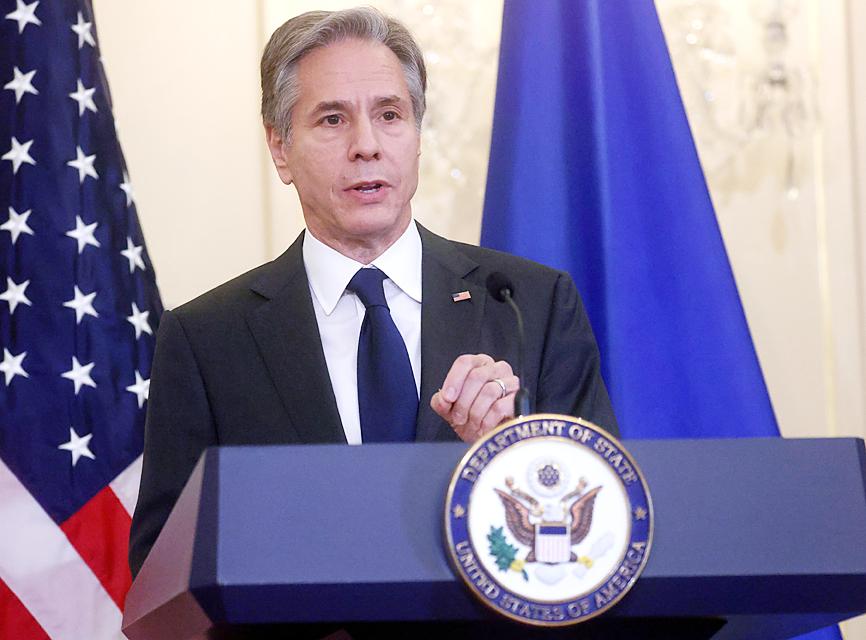The US and its allies would take unspecified “action” if China were to use force to alter the “status quo” over Taiwan, US Secretary of State Antony Blinken said on Wednesday.
Blinken was asked at a forum hosted by the New York Times whether the US would step in to defend Taiwan in the event of an attack by China. He repeated regular US statements that Washington’s role is to make sure the island has the means to defend Taiwan, as is required under US law.
“At the same time, I think it’s fair to say that we’re not alone in this determination to make sure that we preserve peace and stability in that part of the world,” Blinken said.

Photo: Reuters
“There are many countries, both in the region and beyond, that would see any unilateral action to use force to disrupt the status quo as a significant threat to peace and security, and they too would take action in the event that that happens,” he added.
Blinken did not say what sort of action he was referring to.
US President Joe Biden caused a stir last month when he said the US would come to Taiwan’s defense if China attacked.
Those remarks appeared to depart from a long-held policy of “strategic ambiguity,” not making clear how the US would respond. The White House quickly said Biden was not signaling a change in policy, and some analysts dismissed his comments as a gaffe.
US Representative Adam Schiff, the Democratic chairman of the influential US House Intelligence Committee, last week urged the Biden administration to be less ambiguous about what he called a US obligation to defend Taiwan from attack by China.
Blinken’s remarks came ahead of a virtual meeting between Biden and Chinese President Xi Jinping (習近平), which a source briefed on the matter said would be held as soon as next week.
Asked if the meeting would happen next week, Blinken said only that it was “coming up soon.”
In Taipei, Ministry of Foreign Affairs Department of North American Affairs Deputy Director-General Regine Chen (陳慧蓁) said senior US officials have repeatedly affirmed their commitment to Taiwan against Chinese military intimidation.
The government would continue to deepen cooperation with the US and other like-minded nations to promote peace, stability and prosperity in the Taiwan Strait and Indo-Pacific region, she added.
As for the planned virtual meeting between Biden and Xi, the ministry said it would coordinate closely with the US to ensure that its policy toward Taiwan remains unchanged.
In other developments, a US congressional delegation comprised of US senators John Cornyn, Tommy Tuberville, Mike Crapo and Mike Lee, as well as US Representative Jake Ellzey, who arrived in Taiwan on a US military transport plane on Tuesday, departed yesterday after a visit to Taiwan Semiconductor Manufacturing Co (台積電) in Hsinchu.
Additional reporting by Lu Yi-hsuan and staff writer

Taiwan is gearing up to celebrate the New Year at events across the country, headlined by the annual countdown and Taipei 101 fireworks display at midnight. Many of the events are to be livesteamed online. See below for lineups and links: Taipei Taipei’s New Year’s Party 2026 is to begin at 7pm and run until 1am, with the theme “Sailing to the Future.” South Korean girl group KARA is headlining the concert at Taipei City Hall Plaza, with additional performances by Amber An (安心亞), Nick Chou (周湯豪), hip-hop trio Nine One One (玖壹壹), Bii (畢書盡), girl group Genblue (幻藍小熊) and more. The festivities are to

Auckland rang in 2026 with a downtown fireworks display launched from New Zealand’s tallest structure, Sky Tower, making it the first major city to greet the new year at a celebration dampened by rain, while crowds in Taipei braved the elements to watch Taipei 101’s display. South Pacific countries are the first to bid farewell to 2025. Clocks struck midnight in Auckland, with a population of 1.7 million, 18 hours before the famous ball was to drop in New York’s Times Square. The five-minute display involved 3,500 fireworks launched from the 240m Sky Tower. Smaller community events were canceled across New Zealand’s

‘IRRESPONSIBLE’: Beijing’s constant disruption of the ‘status quo’ in the Taiwan Strait has damaged peace, stability and security in the Indo-Pacific region, MOFA said The Presidential Office yesterday condemned China’s launch of another military drill around Taiwan, saying such actions are a “unilateral provocation” that destabilizes regional peace and stability. China should immediately stop the irresponsible and provocative actions, Presidential Office spokeswoman Karen Kuo (郭雅慧) said, after the Chinese People’s Liberation Army (PLA) yesterday announced the start of a new round of joint exercises around Taiwan by the army, navy and air force, which it said were approaching “from different directions.” Code-named “Justice Mission 2025,” the exercises would be conducted in the Taiwan Strait and in areas north, southwest, southeast and east of Taiwan

UNDER WAY: The contract for advanced sensor systems would be fulfilled in Florida, and is expected to be completed by June 2031, the Pentagon said Lockheed Martin has been given a contract involving foreign military sales to Taiwan to meet what Washington calls “an urgent operational need” of Taiwan’s air force, the Pentagon said on Wednesday. The contract has a ceiling value of US$328.5 million, with US$157.3 million in foreign military sales funds obligated at the time of award, the Pentagon said in a statement. “This contract provides for the procurement and delivery of 55 Infrared Search and Track Legion Enhanced Sensor Pods, processors, pod containers and processor containers required to meet the urgent operational need of the Taiwan air force,” it said. The contract’s work would be